
第42章
On this little fact, too gross to mention, they and their kind had in secret built and built, till it was not too much to say that laws, worship, trade, and every art were based on it, if not in theory, then in fact. For it must not be thought that those eyes were dull or that nose plain--no, no, those eyes could put two and two together; that nose, of myriad fancy, could imagine countless things unsmelled which must lie behind a state of life not quite its own.
It could create, as from the scent of an old slipper dogs create their masters.
So Stephen and Cecilia sat, and their butler brought in the bird. It was a nice one, nourished down in Surrey, and as he cut it into portions the butler's soul turned sick within him--not because he wanted some himself, or was a vegetarian, or for any sort of principle, but because he was by natural gifts an engineer, and deadly tired of cutting up and handing birds to other people and watching while they ate them. Without a glimmer of expression on his face he put the portions down before the persons who, having paid him to do so, could not tell his thoughts.
That same night, after working at a Report on the present Laws of Bankruptcy, which he was then drawing up, Stephen entered the joint apartment with excessive caution, having first made all his dispositions, and, stealing to the bed, slipped into it. He lay there, offering himself congratulations that he had not awakened Cecilia, and Cecilia, who was wide awake, knew by his unwonted carefulness that he had come to some conclusion which he did not wish to impart to her. Devoured, therefore, by disquiet, she lay sleepless till the clock struck two.
The conclusion to which Stephen had come was this: Having twice gone through the facts--Hilary's corporeal separation from Bianca (communicated to him by Cecilia), cause unknowable; Hilary's interest in the little model, cause unknown; her known poverty; her employment by Mr. Stone; her tenancy of Mrs. Hughs' room; the latter's outburst to Cecilia; Hughs' threat; and, finally, the girl's pretty clothes--he had summed it up as just a common "plant," to which his brother's possibly innocent, but in any case imprudent, conduct had laid him open. It was a man's affair. He resolutely tried to look on the whole thing as unworthy of attention, to feel that nothing would occur. He failed dismally, for three reasons. First, his inherent love of regularity, of having everything in proper order; secondly, his ingrained mistrust of and aversion from Bianca; thirdly, his unavowed conviction, for all his wish to be sympathetic to them, that the lower classes always wanted something out of you. It was a question of how much they would want, and whether it were wise to give them anything. He decided that it would not be wise at all.
What then? Impossible to say. It worried him. He had a natural horror of any sort of scandal, and he was very fond of Hilary. If only he knew the attitude Bianca would take up! He could not even guess it.
Thus, on that Saturday afternoon, the 4th of May, he felt for once such a positive aversion from the reading of reviews, as men will feel from their usual occupations when their nerves have been disturbed. He stayed late at Chambers, and came straight home outside an omnibus.
The tide of life was flowing in the town. The streets were awash with wave on wave of humanity, sucked into a thousand crossing currents. Here men and women were streaming out from the meeting of a religious congress, there streaming in at the gates of some social function; like bright water confined within long shelves of rock and dyed with myriad scales of shifting colour, they thronged Rotten Row, and along the closed shop-fronts were woven into an inextricable network of little human runlets. And everywhere amongst this sea of men and women could be seen their shadows, meandering like streaks of grey slime stirred up from the lower depths by some huge, never-ceasing finger. The innumerable roar of that human sea climbed out above the roofs and trees, and somewhere in illimitable space blended, and slowly reached the meeting-point of sound and silence--that Heart where Life, leaving its little forms and barriers, clasps Death, and from that clasp springs forth new-formed, within new barriers.
Above this crowd of his fellow-creatures, Stephen drove, and the same Spring wind which had made the elm-trees talk, whispered to him, and tried to tell him of the million flowers it had fertilised, the million leaves uncurled, the million ripples it had awakened on the sea, of the million flying shadows flung by it across the Downs, and how into men's hearts its scent had driven a million longings and sweet pains.
It was but moderately successful, for Stephen, like all men of culture and neat habits, took Nature only at those moments when he had gone out to take her, and of her wild heart he had a secret fear.
On his own doorstep he encountered Hilary coming out.
"I ran across Thyme and Martin in the Gardens," the latter said.
"Thyme brought me back to lunch, and here I've been ever since.""Did she bring our young Sanitist in too?" asked Stephen dubiously.
"No," said Hilary.
"Good! That young man gets on my nerves." Taking his elder brother by the arm, he added: "Will you come in again, old boy, or shall we go for a stroll?""A stroll," said Hilary.
Though different enough, perhaps because they were so different, these two brothers had the real affection for each other which depends on something deeper and more elementary than a similarity of sentiments, and is permanent because unconnected with the reasoning powers.